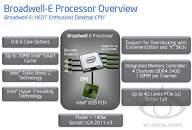Wednesday, October 22nd 2014

Intel Core i7 "Broadwell-E" HEDT Chips Arrive in 2016
Intel is beginning to put out the first details of its next high-end desktop (HEDT) processors, internally. Codenamed "Broadwell-E," the company's next Core i7 HEDT chips will be built in the existing LGA2011v3 package, and will be compatible with existing motherboards based on Intel's X99 Express chipset (with BIOS updates). Much like "Ivy Bridge-E" was to "Sandy Bridge-E," these chips will introduce only incremental updates, and nothing major, in terms of architecture.
To begin with, Core i7 "Broadwell-E" will be built in the 14 nanometer silicon fab process, and will feature 6 to 8 cores based on the "Broadwell" micro-architecture. These cores will be cushioned with up to 20 MB of L3 cache. The chip is pin-compatible to "Haswell-E," and so its I/O will be identical, featuring a quad-channel DDR4 integrated memory controller. One difference is that Intel may can the 28-lane PCIe approach with the entry-level part; or at least it doesn't find mention on the slide. If it's true, all parts based on this silicon, will feature 40-lane PCIe interfaces. The TDP of these chips will be rated at 140W. Intel is expected to launch the Core i7 "Broadwell-E" in 2016.
Source:
VR-Zone
To begin with, Core i7 "Broadwell-E" will be built in the 14 nanometer silicon fab process, and will feature 6 to 8 cores based on the "Broadwell" micro-architecture. These cores will be cushioned with up to 20 MB of L3 cache. The chip is pin-compatible to "Haswell-E," and so its I/O will be identical, featuring a quad-channel DDR4 integrated memory controller. One difference is that Intel may can the 28-lane PCIe approach with the entry-level part; or at least it doesn't find mention on the slide. If it's true, all parts based on this silicon, will feature 40-lane PCIe interfaces. The TDP of these chips will be rated at 140W. Intel is expected to launch the Core i7 "Broadwell-E" in 2016.

59 Comments on Intel Core i7 "Broadwell-E" HEDT Chips Arrive in 2016
No way am I spending huge extra bucks for last-gen cores.
I have seen a review and honestly speaking it wasn't very convincing, yeah, kind of promises some improvements but only this.
Not sure honestly what to think yet of the entire broadwell lineup will be but I have a feeling it will justify itself as much as the recent Haswell-E has. It won't be completely necessary for everyone of course but it comes down to your needs and your current systems. Plus we never know as Intel could decide to make the middle an 8 core which would shake things up again.
Stay on topic.
Thank you.
For all we know the tweaking will continue with Broadwell-E and a more compelling configuration may present itself.
However, the mainstream line should become more compelling too if Intel doesn't slow down their cadence too much.
One thing I am almost certain of is that we will have a repeat of the transition from Sandy Bridge-E to Ivy Bridge-E. I recall a number of people questioning why Intel would even bother to release such an (paraphrasing) incremental upgrade on the LGA2011 / X79 / C600 platform. And I remember thinking, something like "so you would prefer one round of processors for a given platform and no more before Intel moves on to a different socket / chipset?".